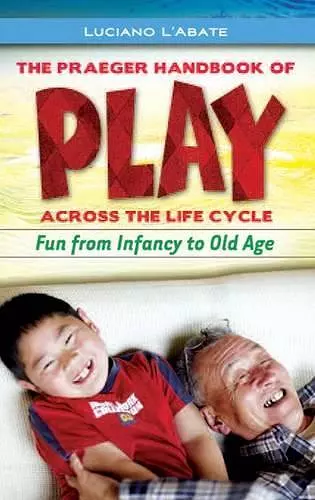The Praeger Handbook of Play across the Life Cycle
Fun from Infancy to Old Age
Format:Hardback
Publisher:Bloomsbury Publishing PLC
Published:30th Jun '09
Currently unavailable, and unfortunately no date known when it will be back

As people in developed societies worldwide focus more and more of their time and energy on work, "playtime" has plummeted, and the equation of playful activities with "laziness," or "pointlessness," has become common. Even in schools, the necessity for play has become an issue of heated debate.
This volume shows how we play at various ages and stages, and why play is so vital to our wellbeing.
Most American adults have little respect for play, for themselves or, increasingly, for their children.
This volume shows how we play at various ages and stages, and why play is so vital to our wellbeing.
Most American adults have little respect for play, for themselves or, increasingly, for their children. Are we losing anything with this attitude? Yes, says longtime clinical psychologist Luciano L'Abate. In a book that has a message for us all, L'Abate presents research showing that play, as one scholar put it, "is not a luxury, but rather a crucial dynamic of healthy physical, intellectual, social, and emotional development at all age levels."
The Praeger Handbook of Play across the Life Cycle: Fun from Infancy to Old Age, shows how play and playful activities have developed and changed across recent history, and how their necessity has been the subject of changing cultural and educational views and controversies. The book overviews the history of play, summarizes current research and theory, shows how we play at various ages and stages, and explains why that helps us develop into healthy people—physically, intellectually, emotionally, and spiritually.
"L'Abate (emer., Georgia State Univ.) has written a valuable reference detailing the central role that play, in its many forms, has in the epigenetic life cycle, from infancy all the way to old age. In doing so, he fills in an epistemological gap usually not acknowledged in personality theory. He covers in detail every aspect of play: its varied manifestations across the life span, its relevance to personality and social development, prevailing cultural attitudes towards it, and how it is instrumental in aiding various populations (e.g., individuals with disabilities, aggressive youth). All the various strands come together in a multifaceted hierarchical paradigm that presents an integrative conceptual structure highlighting the elements of play. The references cited are extensive and the narrative is easy to follow, sprinkled with personal anecdotes and vignettes about L'Abate's grandchildren. Linking theory to therapeutic intervention, this is a superb reference for all concerned with play development. Summing Up: Essential. Lower- and upper-division undergraduates, graduate students, professionals, general readers." - Choice
"For psychologists, psychiatrists, other mental health practitioners, play therapists, leisure time and recreation specialists, and scholars of development and personality, L’Abate (clinical psychology, Georgia State U., Atlanta) examines the history of play, details how it affects people from infancy to old age, and argues for its importance to physical, intellectual, emotional, and spiritual well-being. He illustrates how people play at different stages of the life cycle and how it is part of development and socialization, as well as the consequences of its changes today. He also discusses its benefits and applications in therapy and rehabilitation and controversies over play, including technology, the media, and education. He excludes discussion of animal play, advocacy and theory, and neurological and cerebral functioning." - Reference & Research Book News
"Toward this end, the author frequently interjects anecdotes from his own life and the lives of his family and friends. These stories serve as miniature case studies that illustrate relevant theoretical and empirical points in a manner that makes his book all the more enjoyable. . . . This handbook is best read from beginning to end but also is the type of book one may read in parts, as a reference or as guided by one’s interests. . . the volume would make an excellent starting point for a graduate student beginning a research program in play. Of course, the handbook would also serve as a superb tool for the seasoned psychologist or psychotherapist to update his or her knowledge of a field that has evolved considerably in recent years as lifestyle and technology changes, including the invention of the popular Nintendo Wii, have altered the way many play. The addition of several helpful appendices makes the volume all the more attractive for such purposes. For instance, Appendix A offers an annotated bibliography of some significant sources, including books, journal titles, professional organizations, and websites. University libraries will want to own this book, as will many public libraries as well." - PsycCRITIQUES
"The inclusion of the topic of adult play solidifies its must-read status for scholars interested in understanding diverse expressions and functions of play....It is clearly written and can serve as a necessary textbook for graduate-level courses that focus on the study of play and leisure across the lifespan. The Praeger Handbook of Play across the Life Cycle is an engaging, extensive overview of play from different perspectives, emphasizing play as a valuable activity for individuals of all ages." - American Journal of Play
- Winner of Outstanding Academic Title, 2009 2010 (United States)
ISBN: 9780313359293
Dimensions: unknown
Weight: unknown
335 pages